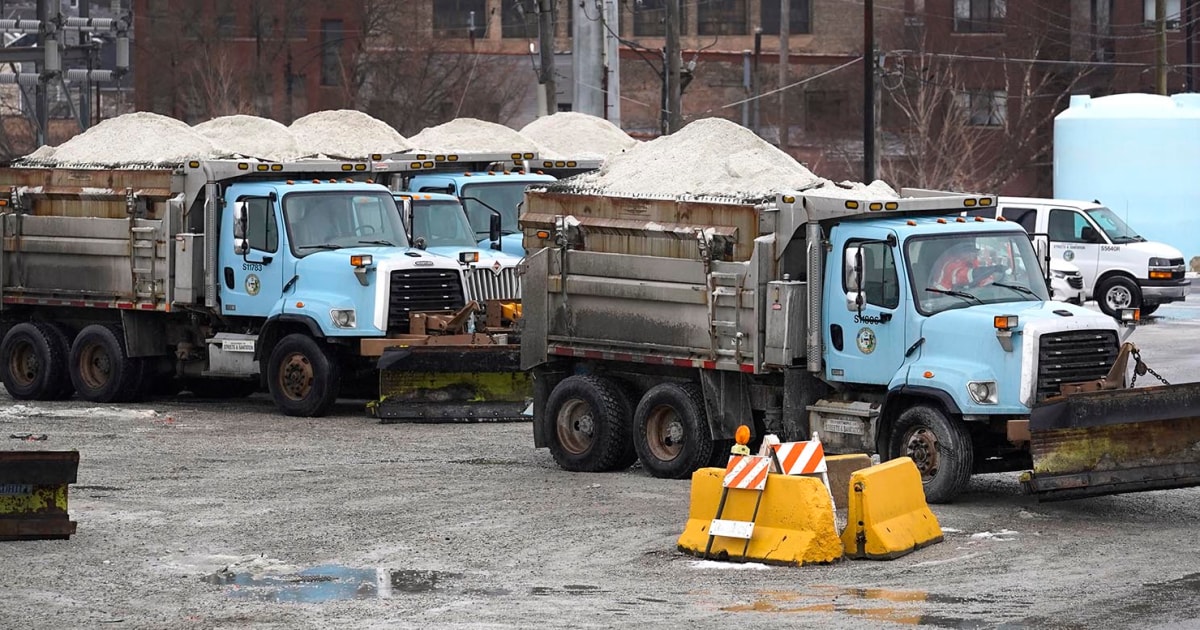Salt trucks, routinely used in Chicago winters to combat ice on roadways, were not deployed this weekend to deter ICE, the city said, despite claims made on social media videos.
Chicago has been bracing for a surge of immigration enforcement and the potential arrival of the National Guard, following President Donald Trump’s claims that he would soon target the city. Over the weekend, video posts showed fleets of salt trucks in the city, with some on social media claiming that they were being deployed to strategically block Immigration and Customs Enforcement and federal immigration enforcement activity.
That wasn’t the case.
The city told NBC News in a statement that the salt trucks were there “to support public safety efforts related to a planned protest and the Taste of Chicago.”
The spokesperson with the Chicago Department of Streets and Sanitation said in its statement that this use of salt trucks was a “routine practice.”
Thousands of people protested across Chicago on Saturday to oppose ICE activity in the city and any deployment of the National Guard there. A Mexican Independence Day parade and celebration in the neighborhood of Pilsen took place as scheduled, but drew a smaller crowd than usual, NBC Chicago reported.
An aide for Illinois Gov. J.B. Pritzker told NBC News on Monday that they are monitoring reports of some federal law enforcement arrests over the weekend, but they’ve seen nothing to suggest a surge in immigration enforcement operations has begun in Chicago.
As of Monday morning, the aide said there still hasn’t been any communication or coordination from the White House to the governor’s office directly. Pritzker said last week that Illinois State Police did get a call from Border Patrol Chief Gregory Bovino, warning of federal operations “sometime in the coming week.”
In the face of Trump’s threats, Pritzker’s team said their strategy is to share as much information as possible to reduce any element of surprise. They said that Pritzker’s responses to the administration will continue to emphasize that he takes Trump’s threats seriously.
Trump on Saturday posted what appeared to be an AI-created image of himself in front of the Chicago skyline with helicopters, flames and the phrase “Chipocalypse Now.” The president’s post appeared to threaten Chicago with troops and deportations.
“‘I love the smell of deportations in the morning…’ Chicago about to find out why it’s called the Department of WAR,” read the president’s post on Truth Social, appearing to reference the 1979 film “Apocalypse Now,” which depicts America’s war in Vietnam. It also appeared to reference an executive order from the president on Friday that the Defense Department be rebranded as the Department of War.
The post drew strong criticism and pushback from Democratic leaders in Illinois.
“The President of the United States is threatening to go to war with an American city. This is not a joke,” Pritzker wrote in a social media post on Saturday. “This is not normal. Donald Trump isn’t a strongman, he’s a scared man. Illinois won’t be intimidated by a wannabe dictator.”
Chicago Mayor Brandon Johnson, also a Democrat, joined Pritzker in condemning the president’s remarks.
“The President’s threats are beneath the honor of our nation, but the reality is that he wants to occupy our city and break our Constitution,” Johnson wrote on social media. “We must defend our democracy from this authoritarianism by protecting each other and protecting Chicago from Donald Trump.”
On Sunday, Trump appeared to downplay the previous social media post.
“We’re not going to war. We’re going to clean up our cities,” Trump said. “We’re going to clean them up so they don’t kill five people every weekend. That’s not war. That’s common sense.”
Democratic officials have spoken out all last week against Trump’s plans to surge federal law enforcement in Chicago to combat what he says are high crime rates.
Statistics show crime has been down in various cities, including Chicago. According to the most recent statistics, homicides have dropped 31% from last year, while shootings were down 37.4%. Total violent crime declined 21.6%.

